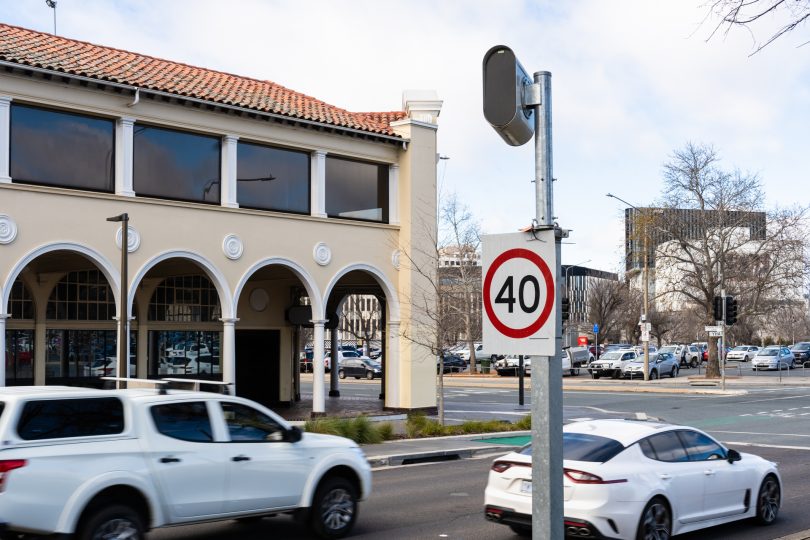
An inquiry into the 40 km/h zones in Civic has recommended waivers for some fines issued in July last year. Photo: Dominic Giannini.
An inquiry into the thousands of fines issued after speed limits in parts of the city centre were reduced last year has recommended some should be waived as they may result in financial hardship.
But for the ACT Council of Social Service (ACTCOSS), this is only a start.
The organisation has been calling on the government to introduce an income-based approach to all government fines, fees and charges.
According to ACTCOSS CEO Dr Emma Campbell, fines issued at flat rates don’t have the same effect on high-income earners as they do on low-income earners, with the latter being “disproportionately and unfairly impacted”.
Around 40,000 people in the ACT live in low-income households.
“People on low incomes and income support have told us that they already have to compromise on food, gas and electricity, clothing and education expenses and make tough choices between basics such as a trip to the dentist or keeping the car on the road,” Dr Campbell said.
“A fine can be the final straw for some families and individuals, creating a financial situation that spirals into crisis or even puts them at risk of contact with the criminal justice system.”
Canberrans are able to place fines on a payment plan so they can be paid off in instalments or undertake community service in their place in other instances.
But Dr Campbell is worried the impacts of the pandemic have not been felt evenly across the ACT, and it’s people who are already disadvantaged that have borne the economic brunt of COVID-19.
She said it’s high time the government takes the opportunity to explore a fine system based on income.
The ACT Legislative Assembly’s Planning, Transport and City Services Committee – which released its report on Friday – recommended waivers should be considered only in instances where fines had resulted in financial hardship.
It only asked the government to consider waiving fines and demerit points for the month of July last year.
The committee also recommended additional warning systems for similar speed changes in the future, and that the government should consider a permanent waiver system for vulnerable road users – either due to financial hardship or mental health.
However, it recommended the government continue implementing plans to lower the speed limit in other parts of the city.
A new 40 km/h zone was introduced in some areas of the city such as Northbourne Avenue, London Circuit and Barry Drive in March last year, although drivers were allowed a grace period until July.
More than 20,000 drivers were caught speeding in a two-week trial period in June before fines started being issued, and on the first day of enforcement, more than 1200 drivers were caught speeding.
But motorists who were caught speeding during the grace period were not issued with a warning letter, which prompted some criticism from the NRMA, as well as the Canberra Liberals at the time.
Last year, the ACT Opposition called on the government to drop all fines issued by the new cameras in July after Opposition spokesperson for transport Mark Parton alleged a lack of messaging ahead of the speed change had resulted in a “perverse outcome“.
Mr Parton said the amount of revenue raised by the speed cameras was proof that the information campaign intended to alert motorists of the change had failed.
Original Article published by Lottie Twyford on Riotact.




